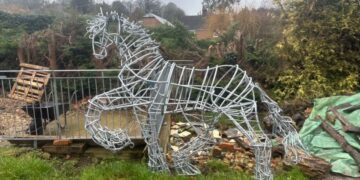
Steps are being taken to control the seagull population in parts of Penrith, where claims are being made that the birds have been “aggressively dive-bombing” members of the public.
Meanwhile, residents have been taking to social media to vent about the birds, which some see as a nuisance.
Comments online have included one resident complaining: “I’m sick of being dive-bombed by them when out on my mobility scooter. They are gutsy.”
Reports have also been made of a water pistol having to be carried to deter the birds, which are known to swoop on people during the nesting season when they are highly motivated to protect their young.
One social media user branded the birds “towngulls” rather than seagulls, as they are an established part of the local wildlife population, despite being some way from the coast. The birds are protected by law, with some types of gull categorised as in decline.
One part of town where gulls are seen in high numbers is its industrial estates, where the Business Improvement District (BID) managers said they had received “numerous reports from businesses about the nuisance caused by gulls”.
A spokesman for the BID spoke to the Herald this week about the measures being taken to tackle the issue.
“A comprehensive gull control programme is actively being implemented across Penrith Business Parks due to the significant damage gulls cause to property and the risk they pose to staff and customers through aggressive dive bombing.
“The Penrith Industrial BID management team has received numerous reports from businesses about the nuisance caused by gulls. Over the past few years, this programme has successfully decreased gull activity through humane methods.
“Earlier this year, the Penrith Industrial BID collaborated with Richard Cooper, a specialist from the Owl Trust, to launch an intensive gull control initiative. After just two weeks, a significant reduction in gull activity was observed, as the birds were deterred from nesting within the business parks. Importantly, this process is entirely non-harmful to the gulls.
“In addition, the Industrial BID is working closely with Natural England to secure the necessary licensing for continued gull control efforts. Positive responses have been received, and as part of their strategy, two laser systems approved by Natural England have been installed. These systems are renowned for their effectiveness in reducing urban gull populations.
“The Penrith Industrial BID’s dedication to managing gull populations not only improves the environment for businesses, staff, and customers but also contributes positively to the overall wellbeing of the local ecosystem.”
One of the factors known to attract gulls to an area is readily available food, from refuse sites and bins. The RSPCA recommends that domestic rubbish is stored in bins, rather than in bags, to deter the birds from foraging.































